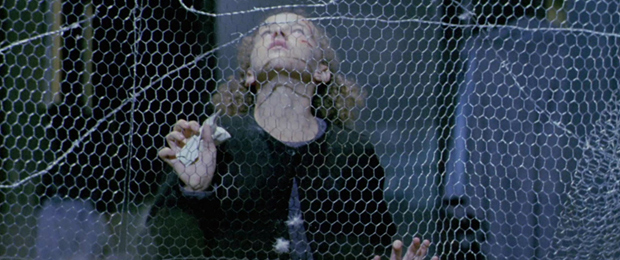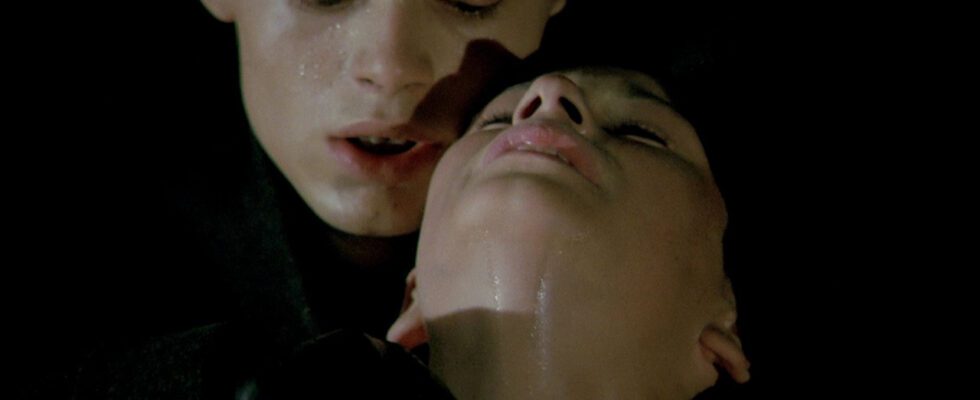The cinema is full of radical, disturbing, sometimes unbearable works, capable of challenging and / or revolting the spectators. And in this register, the very rare horror drama “Tras el cristal”, released in 1986, is placed there…
In the voluminous encyclopedia of world cinematographic productions, shocking works are not lacking. If many of them have lapsed abundantly into unhealthy voyeurism, ultra-violence and gratuitous sadism, sometimes surfing shamelessly on current trends as long as there are a few tickets up for grabs, other productions more or less less recent have fortunately taken on the task of setting certain record straight. This is the case of the shocking Spanish film Tras el cristal, released 37 years ago.
The end of the Franco dictatorship and its leaden screed, in 1975, logically caused a wind of freedom to blow over Spanish artistic creation. And carried to the front of the stage, thanks to a new cultural current baptized Movidaa whole new generation of filmmakers, like Pedro Almodovar.
Much less known than his colleague, the filmmaker Agusti Villaronga signed in 1986, at the age of 33, a first feature film as chilling as shocking; a work that would probably be impossible to do now: Tras el cristal. That such a film was able to see the light of day in a Spain that was certainly recovering freedom, but still deeply conservative in the middle of the 80s, is quite staggering.
A very rare film, never shown on television and unseen for years (a dvd edition was released by us in almost complete anonymity in 2009), which was not screened again until 2016, during the 66th Berlin International Film Festival.
Tras el crystalis the story of Klaus (Gunter Meisner), an ex-Nazi doctor stationed in a concentration camp during the war, who indulged in sadistic experiments and sexual crimes on young boys.
After the war, he takes refuge incognito in Franco’s Spain, where he leads a very comfortable life with his wife Griselda (Marisa Paredes, one of Almodovar’s muses) and his only daughter, Rena (Gisela Echevarria).
But, there too, his demons come back to life, and he surrenders again, in secret, to his depraved and criminal desires. Until the day when, consumed by shame and guilt, he makes a suicide attempt, which fails. Now confined to a room and kept alive by an iron lung that gives him oxygen, he is cared for by his resentful wife.
TEM Productores SA
It is in this toxic environment that Angelo (David Sust) shows up at their home one day; a strange and handsome young man, who offers his services as a nurse. Against his wife’s wishes, Klaus insists that this new visitor take up this position.
A particularly perverse relationship will be tied between Angelo and Klaus, becoming even more unhealthy when Angelo reveals to him that he has found his war diaries in which the former Nazi doctor recorded all his atrocious experiences and sexual crimes… The words now turn into action. Klaus’ shame fades to become desire again, and a new wave of child murders begins…
With its mixture of themes evoking Nazism, pedophilia, homosexuality and torture, it is an understatement to say that Tras el crystal deeply shocked, and still remains so, 37 years after its release. To date, it is still banned in Australia, despite an attempt to screen it in 1995 as part of a festival; even the DVD was banned there in 2005. In Britain, it was not even submitted to the film classification committee, no doubt in anticipation of an outright ban.
Thanks to a tense staging, without ever falling into gore or great guignolesque, always on the razor’s edge, Agusti Villaronga delivers an extremely transgressive work plunging the spectators into the meanders of the human soul, of absolute darkness. A film that is all the more uncomfortable in that it also uses the register of horror, without fully pouring into it, to suggest the spectator’s complicity with the abominable acts of its characters.

TEM Productores SA
The subject of his film, which is also inspired by the story of Gilles de Rais, comrade in arms of Joan of Arc who became a child killer, is also very similar to that of the story A gifted pupil written by Stephen King, which was one of four stories in his collection different seasons published in 1981.
It is unclear if Villaronga caught wind of this story at the time. Still, his film literally buries the clumsy adaptation made by Bryan Singer in 1998 regarding the treatment of themes that the two works have in common.
